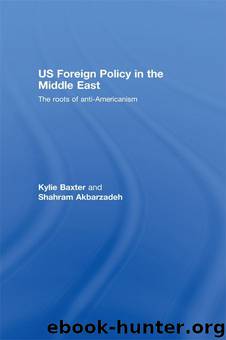US Foreign Policy in the Middle East: The roots of anti-Americanism by Baxter Kylie & Akbarzadeh Shahram

Author:Baxter, Kylie & Akbarzadeh, Shahram
Language: eng
Format: epub
ISBN: 978-1-134-12897-6
Publisher: Taylor and Francis
Published: 2012-08-21T04:00:00+00:00
RESOLUTION OF THE AFGHAN CONFLICT
The Gorbachev era heralded significant changes in Soviet politics. Moscow increasingly viewed the continuation of the conflict in Afghanistan as an obstacle to the realization of its newly articulated domestic policies such as perestroika. The change in Soviet direction was underscored in February 1988 when the Politburo publicly announced its intention to withdraw troops from Afghanistan. This instance provides an interesting insight into the behaviour of a state in a time of war. It can be argued that internal forces, such as a leadership change, had a much greater role than military actions or the US decision to supply Stinger missiles in bringing this conflict to a close. As Richard Falk has pointed out, the withdrawal of troops was ‘consistent with the overall thrust of Gorbachev’s leadership … perestroika; reducing east–west tensions; and eliminating by unilateral initiative expensive and unsuccessful Soviet commitments overseas’ (1989: 144).
As a result of international diplomacy, on 14 April 1988 the Geneva Accords were signed, formally bringing to a close the conflict in Afghanistan. Although the set withdrawal date for Soviet forces of 15 February 1989 was met, many observers criticized the Accords for failing to represent the interests of the Afghan people (Saikal and Maley 1991: 100–17). The Accords were essentially negotiated between Pakistan, as the major backer of the Mujahideen, and the Soviet-backed Afghan regime in Kabul. Popular representation was conspicuously absent.
On reflection, it can be seen that the Soviet Union misjudged the conflict in Afghanistan both in terms of military needs and, perhaps, in terms of the willingness of the United States to commit resources to the conflict and raise the stakes. Although parallels to the American experience in Vietnam have often been drawn, caution needs to be exercised when comparing the two conflicts. In both, the conventionally organized armies of the superpowers struggled to cope with the guerrilla warfare tactics of their opponents; however, the Afghan war was a much smaller affair. The Soviet Union remained within its initial limit of 120,000 troops, as opposed to the much larger American deployment of 500,000 in Vietnam. Although the Afghan conflict was deeply unpopular among the Soviet people,4 a more repressive society and tighter governmental control of the media ensured that it did not engender the powerful social changes that the United States experienced during the anti-war movement of the 1970s. However, the power of Soviet public displeasure with the war should not be entirely discounted. As Maley points out, even in ‘highly autocratic systems, significant public dissatisfaction can … constrain’ the leadership’s actions (2002: 53).
As well as exacting a political price in Moscow, the war in Afghanistan also tested the international institutions. As a result of the Soviet Union’s place on the Security Council, the United Nations was largely hamstrung in relation to this conflict. The General Assembly did pass several resolutions condemning the conflict; for example, Resolution 37/37 in 1983 affirmed the sovereign nature of Afghanistan and called for the immediate withdrawal of all foreign troops (UN Resolution 37/37).
Download
This site does not store any files on its server. We only index and link to content provided by other sites. Please contact the content providers to delete copyright contents if any and email us, we'll remove relevant links or contents immediately.
| Anthropology | Archaeology |
| Philosophy | Politics & Government |
| Social Sciences | Sociology |
| Women's Studies |
The Secret History by Donna Tartt(19025)
The Social Justice Warrior Handbook by Lisa De Pasquale(12182)
Thirteen Reasons Why by Jay Asher(8883)
This Is How You Lose Her by Junot Diaz(6869)
Weapons of Math Destruction by Cathy O'Neil(6260)
Zero to One by Peter Thiel(5782)
Beartown by Fredrik Backman(5733)
The Myth of the Strong Leader by Archie Brown(5491)
The Fire Next Time by James Baldwin(5422)
How Democracies Die by Steven Levitsky & Daniel Ziblatt(5210)
Promise Me, Dad by Joe Biden(5139)
Stone's Rules by Roger Stone(5078)
A Higher Loyalty: Truth, Lies, and Leadership by James Comey(4946)
100 Deadly Skills by Clint Emerson(4911)
Rise and Kill First by Ronen Bergman(4775)
Secrecy World by Jake Bernstein(4737)
The David Icke Guide to the Global Conspiracy (and how to end it) by David Icke(4696)
The Farm by Tom Rob Smith(4500)
The Doomsday Machine by Daniel Ellsberg(4480)
